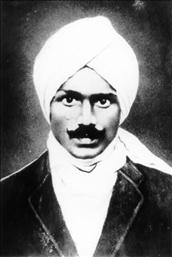 While the US marked the tenth anniversary of the terrorist attacks on the World Trade Centre in New York City and the Pentagon in Washington DC on September 11, many Tamilians the world over observed another, more profound 90th death anniversary of Mahakavi (Great Poet) Subramanya Bharathi, fondly known as Bharathiyar.
While the US marked the tenth anniversary of the terrorist attacks on the World Trade Centre in New York City and the Pentagon in Washington DC on September 11, many Tamilians the world over observed another, more profound 90th death anniversary of Mahakavi (Great Poet) Subramanya Bharathi, fondly known as Bharathiyar.
He was one of the geneses of the concept of nationalism and many of his poems invoked the spirit of nationalism and patriotism, transcending manmade barriers of religion and caste.
He was also a proponent of Tamil ethno-nationalism.
Although born in a conservative and orthodox Tamil Brahmin family in the village of Ettayapuram of Tirunelveli District (on December 11, 1882), Bharatiyar harboured liberal thoughts at an early age.
As the Indian Freedom Movement gathered momentum, he started writing poems and articles in newspapers in exemplary English and Tamil articulating the thoughts of freedom struggle against the colonial British. His works inspired national leaders like Mahatma Gandhi and Nobel Laureate Rabindranath Tagore.
He had a rebellious streak in his blood, which, with his insatiable curiosity, made him travel to Varanasi and understand Hindu culture. His stay in the Northern parts of India enabled him to gain further proficiency in Sanskrit and learn to speak and write in Hindi.
Bharathiyar was a multi-faceted personality. He was a teacher, scholar, poet, social reformer and writer.
As the British went to arrest him, Bharathiyar escaped to Pondicherry, which was then under French rule. His teachings and writings continued from there.
Deteriorating health
Thereafter, he was imprisoned several times and his health suffered a serious setback. An elephant that he used to feed regularly struck him at the Parthasarathy Temple in (Triplicane), Chennai. He miraculously survived the incident but a few months later passed away at his home.
It was the same Parthasarathy temple, which previously helped Swami Vivekananda to mobilise funds for his travel to the US, which became a turning point in his life. Realising the young philosopher’s potential, many wealthy men and intellectuals who lived near the Temple financed his trip.
During his waning days, Bharathiyar encouraged many educated Indians to pursue the freedom struggle.
But his personal life was not as grand as his poems.
His views on religion and his egalitarian approach to the society outraged his community and he was considered an outcaste by his family. No more than five people attended his funeral.
But as it happens in the case of many, his greatness was a late realisation. His poems became a source of inspiration and respect among the Tamil population, leading to the conversion of his home (‘Bharatiyar Illam’) into a place of visit by intellectuals and admirers.
Far from being parochial, Bharatiyar considered the whole world as a family.
His poem, ‘Pera Nadu’ serves as an excellent example of nationalism. It incorporates the aspirations of Indo-Fijians to be a part of their homeland.
Had he lived longer, Bharathiyar would have travelled to Fiji and visited Sri Siva Subramanya Temple in Nandi.






